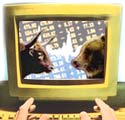

|
|
|
|
| HOME | BUSINESS | NEWS FEATURE | |||
|
December 20, 1999
NEWSLINKS
|
The Rediff Business Special/Nikhil Faleiro 
Imagine buying shares of Reliance Industries through your laptop while driving to work. Or visualise selling Satyam's stock even as you holiday at your favourite seaside resort. You are also able to say: "Brokers and investment agents, stay away, thank you." The dream of many an investor in India is on the verge of becoming reality.
SEBI's imminent and mandatory clearance may have to be supplemented by one from the Department of Telecommunications. For an antiquated rule of DoT states that two private networks -- like a brokers' network and the NSE's network -- cannot be connected without its permission.
The dealer will accept orders placed on the Web site and then feed the information into the stock exchange terminal. A manual interface will still be present, but the advantages of electronic trading are expected to be many. In the current system, the customer has to wait for the dealer to pick up the phone and respond. There are fixed working hours, though unofficial trading is heard of. On the Internet, the customer can place orders even at midnight. SEBI chairman D R Mehta says, "We have to keep pace with technology if we are to progress. Internet trading is the future." In Madras, Mercantile Securities, a stock-broking company belonging to the M A Chidambaram group, has already invested about Rs 10 million in setting up what it calls the Mercantile Integrated Network for Trading or MINT. The system has some of the critical components needed for an Internet trading system -- namely an order-routing and risk management software and an interface with the NSE. After a security component is added and the system is Web-enabled, Mercantile Securities will be ready to offer cyber-broking to its 2,500 high-net-worth clients. Sarath Reddy, managing director, Mercantile Securities, says, ``We are ready but we are just waiting for the formal approvals.'' There is a general consensus that India will have a heady start in Internet trading because software companies have already developed and implemented Net trading solutions in other countries. Says V Santhanam, consultant, Indigo Technologies, which specialises in software for the financial sector, ``There are around 70 broking firms in the country who wish to implement Internet trading immediately.'' There is no denying the enthusiasm for electronic trading, but there are as many fears that Internet-based trading could make the stock market volatile. Then, there is the menace of hackers. But the systemic risks involved in Internet trading are minimal, say analysts. Stock exchanges like the NSE, which have a minor form of electronic trading, have already put limits on exposure that individual brokers can take. This is to ensure that brokers would pay the necessary margins before they scale up the volume of trading. If a broker cannot pay the margins, he would be automatically prevented from trading, thus safeguarding the rest of the market. Since net trading will be carried on through the intermediation of stockbrokers, the stock exchanges will run no additional risk, point out analysts. The risks involved in Net trading are no greater than the risks involved in electronic trading of shares by some leading exchanges. Remember the fear in the market when the NSE first began to deal in electronic shares? The fears of Net trading are similar and just as unjustified. Just as software takes care of the problems involved in trading on terminals, it can take care of the problems of trading on the Net. A simple case is the US where in the period of five years of Net trading, there are about seven million investors trading via the Net. By 1999-end, the figure is expected to go up to 10 million. And according to statistics released by Nasdaq, 15,000 Internet trading accounts are being opened every day in the US and as much as 25 per cent of trade is done online. Manish Shah, vice-president, Gold Crest Securities, says, ``Net trading involves a paradigm shift in convenience for investors and market participants and the effect on the market could be as revolutionary as the shift to electronic trading introduced by the NSE.'' The figures speak for themselves. Before the advent of screen-based trading, the BSE - India's premier bourse, had an average turnover of Rs 1.5 billion. Today, the BSE and NSE have an average daily turnover of almost Rs 50 billion. "This is a striking example of what technology can do. If we do not embrace the Net, then scores of NRIs, foreign investors and investors in India who have access to the Internet but not the BSE or NSE networks, will be missed out. The financial loss to India's stock markets will be immense," says an analyst. What will be the effect of Net trading on the stock market? It seems it will further shift the scales in favour of the big brokers. A full-fledged Net trading system with sophisticated risk management software could entail an investment of Rs 20 million and more. As Reddy of Mercantile says, ``A new team will have to be brought in -- people who are well-versed in the art of the Internet. So a separate Net trading branch will have to be set up which could be costly.'' But for the broker, the minimal cost of setting up a small branch, as compared to opening many offices in several cities, is minimal. With the Internet, these costs would be greatly reduced because the need for a physical presence in every city would be eliminated. Asit Mehta, managing director, Nucleus Securities, says, ``You can get a client from any part of the world just at the click of a button.'' And these broking houses could offer in return the Indian market to a global audience who want to take a share in the pie. So Net trading could open up the whole world to the Indian broking community. Rich NRIs from the Middle East, farmers from Punjab, software professionals from Bangalore, cotton traders from Coimbatore, Indians from Japan, Russia, France and from any part of the globe could all become members of a particular broking firm. And for the broking community, selling of shares will not be the only source of income. Once investors start flocking to a particular Web site of a broker, he can start selling products other than just shares -- like loans against shares, credit cards, car loans, mutual funds, anything. And there could be interesting tie-ups between banks and brokers. Gul Teckchandani, chief operating officer, Sun F&C, says, ``Banks otherwise have nothing exciting to offer. Internet trading with its vast opportunities is just the outlet for them.'' Stock exchanges too are excited. NSE already has the infrastructure in place, BSE has started working on the project and there is no denying the fact that SEBI too has started actively examining the pros and cons of Internet trading. BSE, for instance, is considering a system wherein an investor can visit its site, specify his broker and then directly type in the name of the scrip he wishes to buy or sell. Kothari Pioneer allows its unit-holders to access their account information via the Net. It is already sending it daily net asset values of funds via e-mail. By March 2000, it hopes to buy and sell units via the Net. An analyst sums up: "The days of dialing mobile telephone numbers and whispering/screaming buy/sell orders could become a thing of the past. Forget the trading circle, forget the trading room. Next time, you want to trade in stocks, do not worry if you are in the sauna or bathroom -- just log in and buy to your heart's content."
|
| Tell us what you think of this report | |
|
HOME |
NEWS |
BUSINESS |
MONEY |
SPORTS |
MOVIES |
CHAT |
INFOTECH |
TRAVEL SINGLES | NEWSLINKS | BOOK SHOP | MUSIC SHOP | GIFT SHOP | HOTEL BOOKINGS AIR/RAIL | WEATHER | MILLENNIUM | BROADBAND | E-CARDS | EDUCATION HOMEPAGES | FREE EMAIL | CONTESTS | FEEDBACK |
|